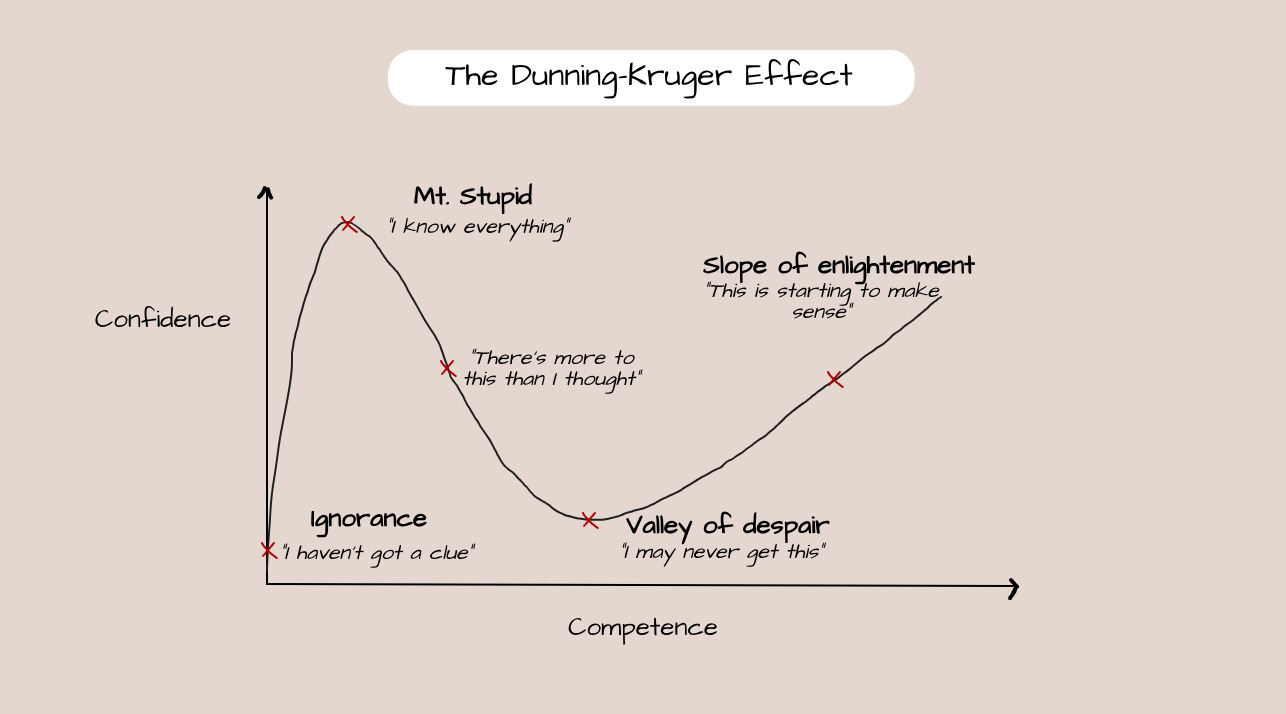Welcome to edition #39 of Food for Thought, my weekly newsletter. Every week I share five things:
One idea I’m thinking about
One thing I’m reading
One thing I’m listening to
One thing I’m watching
One quote I’m pondering
One idea I'm thinking about: The Dunning-Kruger Effect
The Dunning-Kruger Effect is a cognitive bias that makes people think they are much more capable than they really are. It gives a scientific name to a problem that many of us intuitively recognise.
As Charles Darwin said: "Ignorance more frequently begets confidence than does knowledge.”
In his book Think Again, Adam Grant breaks down the Dunning-Kruger effect into four stages.
Ignorance. When you start off, you can be overwhelmed by all the things you don’t know. For example, if you’re learning to code for the first time, just seeing the strange jargon in the syllabus of an online course can scare you off.
Mount Stupid. As you start to get some wins under your belt, your confidence rises rapidly. You misinterpret the progress you have made with all the progress there is to be had. You feel like you are excelling at something new and challenging so must have some inherent talent for it.
Valley of Despair. But this confidence is short-lived. You make mistakes or witness the skills of someone who is years ahead of you. You begin to think you will never be good at this at all. This is equally as dangerous as the peak of Mount Stupid. You can develop imposter syndrome and hold yourself back from success with ‘toxic humility’. This also can have a gendered lens- for example, women tend to underrate themselves and hold back from applying to jobs because they feel they are not good enough,
Slope of enlightenment. As you get more repetitions under your belt, you gradually start to recognise your competence. You take on a mindset of ‘confident humility’. You know the extent of your skills but are still open to new information and the possibility of being wrong.
Why does it occur?
Part of it comes down to ego. But David Dunning (one of the psychologists who coined the term) says it’s more simple than that. When you lack the ability to produce excellence, you also lack the ability to recognise excellence.
For example, if you are emotionally unintelligent, you don’t even know what it looks like to be emotionally skilled. So your initial self-assessment tends to be way off.
What to do about it?
We’ll never be able to completely escape the Dunning-Kruger Effect, but being self-aware is an important first step. Next time you start a new activity like learning a new language or playing tennis, temper your urge to be overconfident right at the beginning
On the flip side, if you’ve built up skills in a domain over several years, ask yourself if you’re holding yourself back with ‘toxic humility’ instead of owning your capabilities.
One thing I’m reading: The Dictionary of Lost Words
I picked up The Dictionary of Lost Words from a streetside public library in Maroubra (a concept that I love!)
It’s the debut novel by Aussie author Pip Williams and starts by following the four-year-old Esme Nicholls as her father and his colleagues are compiling the Oxford English Dictionary in 1886. As some words are lost or discarded, Esme begins to collect the scraps to compile her alternative dictionary.
I’m only about 20% through the book, but the blurb promises to follow Esme into the height of the women’s suffragette movement and the beginning of World War I.
It’s written beautifully and I would recommend picking it up if you’re after a fiction read.
One thing I’m listening to: Empire
Empire is a podcast by two historians - William Dalrymple and Anita Anand.
The first series tells the story of the British in India, covering the East India Company, the Raj, Gandhi and Independence.
I read William Dalrymple’s book, The Anarchy, on the same subject a couple of years ago, but this has been a nice refresher in a more digestible format.
What still blows me away, is that it was all started by a private corporation - The East India Company.
In August 1765, Emperor Shah Alam was defeated by Robert Clive at the Battle of Plassey and forced to hand over the power to collect taxes to the Company.
Within 50 years, the Company ruled most of the subcontinent, with a private army that had grown to 260,000 men.
“The first serious territorial conquests began in Bengal in 1756; 47 years later, the company’s reach extended as far north as the Mughal capital of Delhi, and almost all of India south of that city was by then effectively ruled from a boardroom in the City of London”
It’s the equivalent of Amazon or Google forcibly taking control of one of the biggest economies in the world today.
It’s well worth a listen if you’re even remotely interested in this part of history.
One thing I’m watching: A Man Called Otto
Last week, I watched A Man Called Otto - a touching story about the ‘grumpiest man in America” and how he deals with loss - both of his wife and his sense of purpose after losing his job. It is a remake of the 2015 Swedish film A Man Called Ove, which was based on the 2012 novel of the same name by Fredrik Backman.
Otto is played by Tom Hanks as well as his youngest son Truman Hanks in flashbacks.
My favourite character was Marisol - Otto’s new neighbour who manages to break his cranky exterior and give him a new outlook on life.
While I still enjoyed the first half, the second half really got to me, and I ended up in tears by the end of the movie.
One quote I’m pondering:
“Amateurs built the Ark. Professionals built the Titanic. Don't be scared to do something you are not qualified to do”
- Unknown Author






